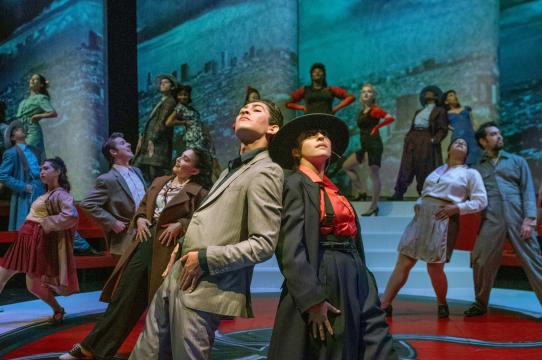The Theater Arts Major combines drama, dance, critical studies, and theater design/technology offering students an intensive, unified undergraduate program.
- 2-minute animated video overview and introduction.
Combining theory and practice, the program seeks to educate the mind, the body, and the imagination of students. Graduates of the UCSC program typically pursue careers in professional theater and dance companies, in film and television, and in teaching at all levels, from university to high school to grade school. Others engage in careers in arts administration, dramatic writing, and related fields.
The program stresses the interrelation of dance, drama, and theatrical design and technology as essential to the successful practice of the theater arts in the contemporary world. The lower-division curriculum requires a range of practical work in the various subdisciplines and a rigorous exposure to the history of drama and dance. At the upper-division level, students are given the opportunity to focus on an area of interest within the discipline in limited-enrollment studios and through direct interaction with faculty. At the same time, they are asked to expand their theoretical perspectives through confrontation with the range of dramatic theories and focused course work in the history and theory of dance, drama, and design. The impact of digital and new media on theater is also explored.
The robust stage and studio spaces available to students of theater arts allow for this breadth of training and performance opportunities.
Resources and Opportunities
A wealth of production opportunities is offered to students. This includes major productions directed by faculty or distinguished visiting artists each quarter, productions directed or choreographed by students, and faculty-directed workshops. Undergraduate students are also given the opportunity to see their own writing, choreography, or intermediate concepts put into production in annual festivals of student work. Opportunities to study and perform non-Western, as well as Euro-American traditions, are a significant part of the program.
Majors who wish to intensify their study of one particular theater arts area before seeking admission to MFA or Ph.D. graduate programs, or work with professional companies are encouraged to apply to the department's Masters of Arts Program.
For a listing of some of the opportunities available by specialty (design, acting, etc.) please start with the Production Opportunities page.
For further information about requirements, declaration, or the Theater Arts Department in general, please explore this website and contact us at theater@ucsc.edu. The department office is located in room J106, Theater Arts Center. More information about our undergraduate degrees can be found in our UNDERGRADUATE HANDBOOK on our Advising page.
Program Learning Outcomes
Our program incorporates dance, design, and drama as essential disciplines in the successful practice of theater arts in the contemporary world.
Graduates from the Theater Arts B.A. program should demonstrate the following:
1. Foundations of Performance. Students should be able to identify and apply basic theatrical techniques in dance, design, and drama.
2. Theatrical histories and theories. Students should be able to recognize and analyze performance works within the general culture and historical period that produced them.
3. Performance experience. Students should be able to translate theater arts concepts into performance, participating in any theatrical endeavor with the rigor, discipline, and imagination necessary to make a meaningful contribution.
4. Research proficiency. Students should be able to formulate personal research questions that expand their knowledge of theater arts, conducting independent research into the history and theory of at least one area of concentration.
5. Creative practice. Students should be able to use theatrical practices and performance experiences to conceive, design, realize and reflect on new performance projects.
6. Appreciation of diversity. Students should be able to recognize and appreciate a wide variety of approaches, cultures, and styles in both past and contemporary performance practice.
7. Communication and critical thinking. Students should be able to use critical vocabularies to communicate clearly about theater arts in written and oral forms.
8. Collaborative skills. Students should be able to work confidently and effectively in groups on a common project.
